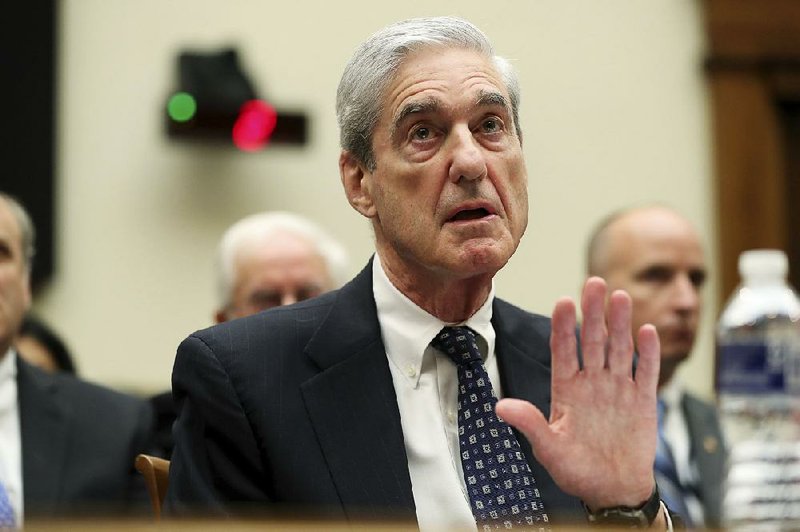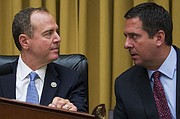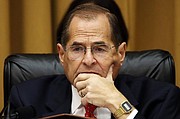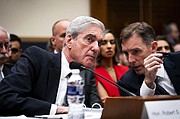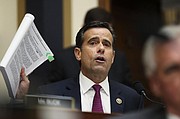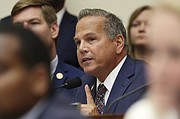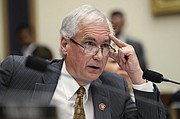WASHINGTON -- Robert Mueller on Wednesday dismissed President Donald Trump's claims of "total exoneration" in the federal probe of Russia's 2016 election interference, and the former special counsel warned that Moscow will again try to sabotage American democracy.
Mueller appeared before the House Judiciary Committee and the House Intelligence Committee in back-to-back hearings, his first since wrapping up his two-year Russia probe.
Mueller provided mostly staccato answers to inquiries from Democrats and Republicans, who tried to maximize their limited opportunity to interrogate the former FBI director about what he did and did not do during his investigation.
"Did you actually totally exonerate the president?" Rep. Jerrold Nadler, a New York Democrat and chairman of the Judiciary Committee, asked.
[Video not showing up above? Click here to watch » https://www.youtube.com/watch?v=94vMuZUIfzA]
"No," Mueller responded.
He condemned Trump's praise of WikiLeaks, which released Democratic emails stolen by Russia. And he said of the interference by Russians and others: "They are doing it as we sit here. And they expect to do it during the next campaign."
His report, he said, should live on after him and his team.
"We spent substantial time assuring the integrity of the report, understanding that it would be our living message to those who come after us," Mueller said. "But it also is a signal, a flag to those of us who have some responsibility in this area to exercise those responsibilities swiftly and don't let this problem continue to linger as it has over so many years."
Rep. Adam Schiff, the Democratic chairman of the House Intelligence Committee, asked, "Your investigation is not a witch hunt, is it?"
"It is not a witch hunt," Mueller replied.
Wednesday's hearing before the Judiciary Committee focused on whether Trump obstructed justice by attempting to seize control of Mueller's investigation. The special counsel examined nearly a dozen episodes, including Trump's firing of FBI Director James Comey and his alleged efforts to have Mueller removed, for potential obstruction.
The afternoon hearing before the House Intelligence Committee delved into ties between the Trump campaign and the Kremlin.
Democratic lawmakers had hoped Mueller would read portions of his report during his nationally televised testimony, making his report both more authoritative and more vivid for Americans who had skipped reading it.
For the most part, Mueller did not play along. He forced lawmakers to give their own readings of parts of his report rather than reciting the conclusions himself. He sometimes gave a forceful defense of his investigation and his team in the face of Republican questions, but his answers were at times faltering. Throughout, he was careful to avoid straying from his report's conclusions.
Trump's GOP allies tried to cast the former special counsel and his prosecutors as politically motivated. They referred repeatedly to what they consider the improper opening of the investigation.
Democrats, meanwhile, sought to emphasize some of the findings of Mueller's 448-page report and weaken Trump's re-election prospects.
Rep. David Cicilline, D-R.I., asked Mueller about Trump's effort to have Corey Lewandowski, his former campaign manager, tell Jeff Sessions, then the attorney general, to limit the investigation to only future cases of foreign interference.
Mueller confirmed various details with monosyllabic answers -- "true" or "yes" -- but balked when Cicilline tried to string them all together.
"I'm not going to adopt your characterization, but I would say the facts that are laid out in the report are accurate," he said.
In his testimony before the judiciary panel, Mueller told Rep. Ted Lieu of California that he did not charge Trump because of a Justice Department legal opinion that says sitting presidents cannot be indicted.
"I'd like to ask you the reason, again, that you did not indict Donald Trump is because of the [Office of Legal Counsel] opinion stating that you cannot indict a sitting president, correct?" Lieu asked.
"That is correct," Mueller said in what appeared a shift from his explanation in his written report.
But in his opening statement in the afternoon hearing before the Intelligence Committee, Mueller offered a "correction," saying he had incorrectly told Lieu that he didn't charge the president with a crime specifically because of the legal opinion.
"That is not the correct way to say it," Mueller said. "We did not reach a determination as to whether the president committed a crime."
His team, he said, never started the process of evaluating whether to charge Trump.
Mueller did not want to testify on Capitol Hill -- he only agreed after Democrats issued him a subpoena.
At times, he appeared to struggle to hear the questions, asking lawmakers to repeat themselves. He, in turn, was reminded more than once to speak into the microphone so others could hear him.
Though Mueller described Russian election interference as among the most serious challenges to democracy he had encountered in his decadeslong career, Republicans focused on his conclusion that there was insufficient evidence to establish a criminal conspiracy between the Trump campaign and Russia.
"Those are the facts of the Mueller report. Russia meddled in the 2016 election. The president did not conspire with Russians. Nothing we hear today will change those facts," said Rep. Doug Collins, the Judiciary Committee's top Republican.
Mueller, pressed as to why he hadn't investigated a "dossier" of claims that the Republicans insist helped lead to the start of the probe, said that was not his task. That was "outside my purview," he said repeatedly.
Mueller mostly brushed aside Republican allegations of bias. When he was pressed on the fact that multiple members of his team had made contributions to Democratic candidates, Mueller bristled at the implication his prosecutors were compromised.
"I've been in this business for almost 25 years, and in those 25 years I have not had occasion, once, to ask somebody about their political affiliation," Mueller said. "It is not done. What I care about is the capability of the individual to do the job and do the job quickly and seriously and with integrity."
Some Republicans accused Mueller of overstepping his bounds by declaring that Trump was not exonerated.
"The bedrock principle of our justice system is the presumption of innocence," said Rep. John Ratcliffe, R-Texas. "Everyone is entitled to it, including sitting presidents."
Rep. Tom McClintock, R-Calif., described the report as an overtly partisan statement intended to undermine the president.
"It's starting to look like, having desperately tried and failed to make a legal case against the president, you made a political case instead," he said. "You put it in a paper sack, lit it on fire, dropped it on our porch, rang the doorbell and ran."
Although Mueller did little to push back on most Republican criticisms, he flatly rejected McClintock's characterization.
"I don't think you have reviewed a report that is as thorough, as fair, as consistent as the report that we have in front of us," he said.
The special counsel's office ultimately charged 34 people, including 25 Russians.
Among those charged were Trump's former campaign chairman, Paul Manafort; his former national security adviser, Michael Flynn; and his former lawyer and fixer, Michael Cohen. Manafort was convicted at trial, while Flynn and Cohen pleaded guilty.
Roger Stone, Trump's longtime political adviser, is scheduled to stand trial in November on charges of lying to Congress about his conversations involving WikiLeaks. Stone has pleaded innocent.
Information for this article was contributed by Eric Tucker, Mary Clare Jalonick, Michael Balsamo and Jonathan Lemire of The Associated Press; by Mark Mazzetti of The New York Times; and by Chris Megerian and Jennifer Haberkorn of the Los Angeles Times.
A Section on 07/25/2019
